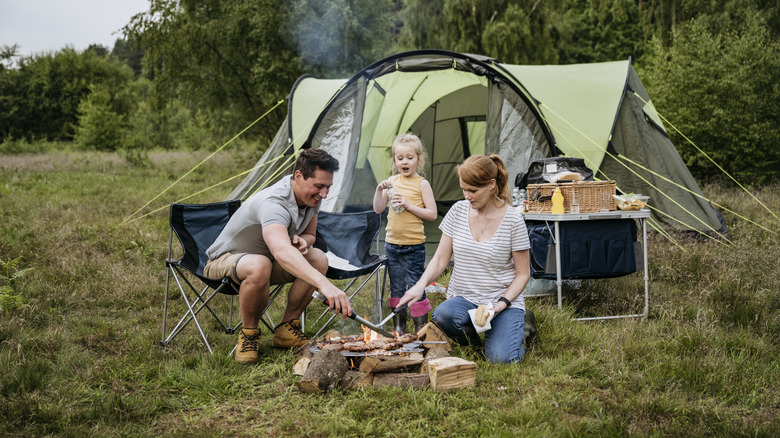Travel Guides Outdoor Adventures Camping
Jupiterimages/Getty Images
Joshua St. James
Use coffee grounds for relief from mosquitoes

Start your bug-busting journey with an item that’s likely a staple in your daily routine — coffee grounds. The strong aroma of coffee grounds is generally disliked by bugs, making it an excellent natural repellent. Insects, particularly mosquitoes, are attracted to the carbon dioxide we exhale, and the smell of coffee can mask that scent, making you less appealing to them. Sprinkling used coffee grounds around your campsite can create a barrier against ants and other insects.
Burnt coffee, in particular, creates an even stronger scent that bugs will avoid at all costs. However, according to the National Park Service, this pungent smell can be an attractor for wildlife, including bears, so be cautious. A metal bowl, ceramic dish, or foil plate can be used to burn dried coffee grounds. Adding a few drops of lighter fluid can help the grounds burn, too. Always exercise caution, pay attention to fire restrictions, and be mindful of wildlife populations before burning coffee grounds.
Boiling the grounds with water and spraying it around your campsite can also help prevent mosquitos and be a more convenient prevention method. Natural chlorogenic acid, found in higher amounts in dark roast coffee, can help prevent the larval development of some mosquito species. Spraying on tent fabrics, camping chairs, nets, and more can do the job and be safer for campers with pets, as they should never ingest coffee grounds.
Bugs can’t stand the scent of onions and garlic

Although they may not be the most popular food option for everyone, onions are another natural insect repellent to add to your camping arsenal. Onions have a sulfur component that repels insects, making them less likely to come near your campsite. To use onions as a bug repellent, use an onion or two in your campfire cooking as a natural bug deterrent.
Add a few cloves of garlic if your recipe calls for it. Garlic contains the same bug-deterring sulfur as onions. If you’re not particularly fond of onions and are worried about the smell around your campsite, avoid yellow onions — they have a higher sulfur content compared to white or red onions, thus creating a more pungent smell. On the other hand, if you’re more concerned about repelling bugs, then go for the yellow onion.
Like coffee grounds, you can create a natural spray by combining onion, garlic, and water. Spritz the mixture around your campsite for added protection against bugs. In addition to repelling insects, onions can help soothe insect bites, so keeping one on hand is helpful. If you get bitten, try rubbing a slice of onion on the affected area to relieve itching and inflammation.
Vinegar and citrus keep ants away

Eclipse_images/Getty Images
Ants are one of the most common pests you may encounter while camping. To keep them at bay, try using vinegar. The strong acidity of vinegar disrupts their scent trails and makes it difficult for them to navigate toward your food or campsite. Plus, vinegar poses no risk for those camping with pets.
Mix equal parts water and white vinegar, or apple cider vinegar for a stronger solution, in a spray bottle and spritz around the areas where you want to keep ants away. You can also spray directly on any visible ants to deter them. The versatility of vinegar extends beyond a bug spray — it doubles as a multi-purpose cleaner perfect for wiping down picnic tables, clean dishes, or freshening your tent or RV.
In addition to white and apple cider vinegar, citrus fruits like lemons, grapefruit, and oranges can also help repel bugs. Citrus contains citronella oil, which is a natural insect repellent. Peeling citrus fruits like lemons or oranges and placing them around your campsite can create a strong scent that repels mosquitos, horseflies, ants, and other insects.

